Orthorexia nervosa is a dangerous eating disorder that you may not have heard of before. It is characterized by an obsession with healthy eating and extreme fear of foods that are considered unhealthy. People who suffer from orthorexia become so fixated on the idea of healthy eating that they begin to deny themselves essential nutrients and eventually develop serious health problems. In this blog post, we will discuss the signs and symptoms of orthorexia nervosa, as well as how to get help if you or someone you know is suffering from this disorder.
Contents
Defining Orthorexia Nervosa
 A rather unheard of and an under-researched eating disorder, Orthorexia Nervosa was only given its name in 1997 by Dr. Steven Bratman. It is defined as an unhealthy obsession with healthy eating. This may sound contradictory but it’s important to understand that Orthorexia sufferers believe that there are good foods and bad foods and that the bad foods are somehow poisonous. They become obsessively concerned with the quality of the food they’re eating and whether or not it is pure, clean, and healthy. This eventually leads to them cutting out entire food groups, which can lead to serious malnutrition.
A rather unheard of and an under-researched eating disorder, Orthorexia Nervosa was only given its name in 1997 by Dr. Steven Bratman. It is defined as an unhealthy obsession with healthy eating. This may sound contradictory but it’s important to understand that Orthorexia sufferers believe that there are good foods and bad foods and that the bad foods are somehow poisonous. They become obsessively concerned with the quality of the food they’re eating and whether or not it is pure, clean, and healthy. This eventually leads to them cutting out entire food groups, which can lead to serious malnutrition.
While this may seem something very health-conscious and almost enviable to some, for orthorexia sufferers, this way of life is extremely restrictive and can have serious consequences on their mental and physical health. Because people with this disorder refuse to eat entire food groups, they often become deficient in essential nutrients and vitamins. This can lead to a whole host of health problems, both mental and physical.
How Is It Different From Other Anorexia Nervosa?
Eating disorders are a complex and often misunderstood topic. Many people confuse Orthorexia with other disorders, such as anorexia nervosa. However, there are some key ways in which these two disorders differ. Anorexia nervosa is characterized by a fear of gaining weight and a desire to be as thin as possible. This often leads sufferers to severely restrict their calorie intake and engage in dangerous behaviors such as bingeing and purging.
Orthorexia, on the other hand, is not primarily concerned with weight or appearance. While people with Orthorexia may also be underweight, this is not always the case. Instead, the focus is on eating “clean” and “healthy” foods. This obsession can lead to orthorexics becoming extremely malnourished, as they are often too afraid to eat anything that they deem as unhealthy.
It also differs from other types of eating disorders such as ARFID, also known as Avoidant/Restrictive Food Intake Disorder. This is a disorder where people avoid certain foods due to an intense fear of choking or vomiting. While the two disorders may share some similar symptoms, such as avoiding particular foods, ARFID sufferers do not necessarily believe that the foods they are avoiding are unhealthy.
Signs And Symptoms
From what we have learnt so far, one of the most prominent sign of orthorexia is an unhealthy obsession with healthy eating. But there are other signs and symptoms to be aware of. People suffering from orthorexia often:
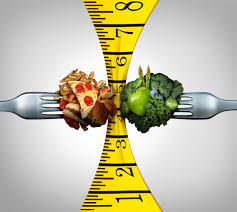
- Have a rigid and inflexible diet
- Avoid foods that they deem as unhealthy
- Become increasingly isolated from friends and family
- Obsessively research healthy recipes
- Cook their meals from scratch
- Exercise excessively
- Have an intense fear of gaining weight
- Become anxious or depressed when they cannot stick to their diet
If you are exhibiting any of these signs, it is important to seek help from a medical professional as soon as possible. Orthorexia can quickly turn into an extremely dangerous and life-threatening eating disorder.
Causes
Eating disorders have a large and complex range of causes. There is no single cause of orthorexia, but there are some risk factors that may make someone more susceptible to developing the disorder. These include:
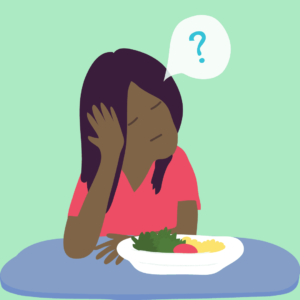
- A history of other eating disorders: If you have previously suffered from an eating disorder, you may be more likely to develop orthorexia.
- Health concerns: People who have allergies or other health concerns may be more likely to develop orthorexia as they become obsessed with eating “clean” and “healthy” foods.
- Media pressure: The pressure to be thin and have the “perfect body” that is often perpetuated by the media can lead to people developing orthorexia as they become obsessed with eating healthy foods.
- Perfectionism: People who are perfectionists or have extremely high standards often put a lot of pressure on themselves. This can lead to them developing orthorexia as they strive for the “perfect” diet.
- Anxiety or Obsessive-Compulsive Disorder: People who suffer from anxiety or OCD may be more likely to develop orthorexia as they become obsessed with healthy eating. This is because they often need to have everything under control in their lives and healthy eating is a way of doing this.
- Unhealthy relationships with food: If you have a complicated or unhealthy relationship with food, you may be more likely to develop orthorexia. This is because people with orthorexia often fixate on the “purity” of the foods they’re eating, which can lead to an obsession with food and nutrition.
- Rigid thinking patterns: If you find yourself getting caught up in all-or-nothing thinking, or if you start to view certain foods as “good” or “bad,” you may be at risk for developing orthorexia.
- Traumatic experiences: Lastly, if one has faced any sort of trauma or adversity in their life, they may be more likely to develop orthorexia. This is because individuals who have gone through difficult experiences often try to find ways to regain a sense of control in their lives. For some people, this may manifest as a coping mechanism to deal with the traumatic aftermath.
If you have any of these risk factors, it does not mean that you will develop orthorexia. However, it is important to be aware of the risks and to seek help if you are exhibiting any signs or symptoms of the disorder.
Consequences
The aftermath of eating disorders can be dangerous and even fatal if not treated properly. Orthorexia is no different. People suffering from orthorexia often have the following consequences.
Physiological
When our body doesn’t receive the right amount of nutrients, it can have serious consequences. People with orthorexia often restrict their diets so much that they don’t get the essential vitamins and minerals their bodies need to function properly. This can lead to:
- Anemia
- Malnutrition
- Dehydration
- Weight fluctuation
- Irregular or missed menstrual cycles
- Muscle weakness
- Deterioration of teeth and gums
- Bone density loss
- Organ damage
- Weakened immune system
- Electrolyte imbalance
- Hair thinning/loss
- Skin and nail problems
- Digestive issues
All these impacts can be problematic and even life-threatening if not treated properly and in time.
Psychological
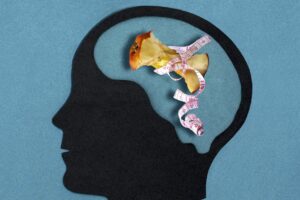 In addition to the impacts on body, orthorexia can also have serious psychological consequences. People suffering from orthorexia often experience:
In addition to the impacts on body, orthorexia can also have serious psychological consequences. People suffering from orthorexia often experience:
- Anxiety
- Depression
- Obsessive-compulsive behaviors
- Social isolation
- Body dysmorphic disorder
- Perfectionism
- Rigid thinking patterns
- Trouble concentrating
- Become isolated and withdrawn
- Low self-esteem
- Intrusive thoughts about food
- Preoccupation with weight and appearance
- Thoughts of suicide or self-harm
If you or someone you know is exhibiting any of these signs or symptoms, it is important to seek help. Orthorexia nervosa is a serious eating disorder that can have dangerous consequences if left untreated. There are many resources available to help you.
Treatment Options
Fortunately, there are treatment options available for those suffering from orthorexia nervosa. The first step is to seek professional help from a nutritionist or therapist who specializes in eating disorders. They will be able to help you develop a plan to get your eating habits back on track.
Nutritional Counseling
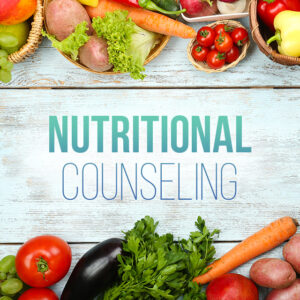 Nutritional counseling is the foremost treatment option for orthorexia. It is important to note that this disorder is not about food. It is a mental disorder that manifests itself through an unhealthy obsession with food. As such, the focus of treatment should be on the mental aspects of the disorder, rather than the physical.
Nutritional counseling is the foremost treatment option for orthorexia. It is important to note that this disorder is not about food. It is a mental disorder that manifests itself through an unhealthy obsession with food. As such, the focus of treatment should be on the mental aspects of the disorder, rather than the physical.
During nutritional counseling, patients will work with a registered dietitian to develop a healthy relationship with food. They will learn about the importance of balance and moderation, as well as how to listen to their bodies’ hunger cues. Patients will also be taught how to cope with any negative emotions that may trigger their orthorexic behaviors.
Some of the most common nutritional counseling techniques and interventions include:
- Encouraging patients to eat a variety of foods from all food groups
- Helping patients become more mindful of their eating habits and behaviors
- Recommending specific nutrient-rich foods to help patients meet their needs
- Creating individualized meal plans based on a patient’s unique dietary requirements
- Teaching patients how to cook healthy meals
- Providing support and guidance to help patients stick to their healthy eating plan
It is important to work closely with a registered dietitian in order to develop a treatment plan that is right for you.
Therapy
In addition to nutritional counseling, therapy can also be an effective treatment for orthorexia. This is because therapy can help patients address the underlying psychological issues that may be causing their disordered eating and help them develop healthy coping mechanisms. Some of the most common types of therapy used to treat eating disorders include:
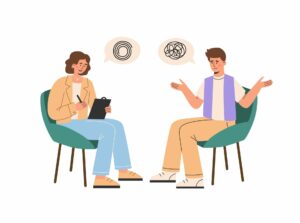
- Cognitive-behavioral therapy (CBT): CBT is a type of therapy that focuses on helping patients change their negative thinking patterns and behaviors.
- Dialectical-behavioral therapy (DBT): DBT is a type of therapy that focuses on helping patients develop healthy coping mechanisms.
- Interpersonal therapy (IPT): IPT is a type of therapy that focuses on helping patients develop and maintain healthy relationships.
- Psychodynamic therapy: Psychodynamic therapy is a type of therapy that focuses on helping patients understand and resolve their internal conflict who are also struggling with eating disorders.
- Family-based therapy: Family-based therapy is a type of therapy that focuses on helping the patient’s family understand and support their loved one’s eating disorder. Group therapy:
- Group therapy: It is a type of therapy that focuses on providing support and guidance to patients in a group setting.
The right type of therapy will vary from person to person. It is important to work with a therapist who specializes in eating disorders in order to develop a treatment plan that is suitable and also effective.
Medication
Although there is no specific medication for orthorexia, there are certain medications that can be used to treat the underlying mental health issues that may be causing the disorder. Some of the most common medications used to treat eating disorders include:
- Antidepressants: Antidepressants are often prescribed to help patients with eating disorders because they can help improve mood and reduce anxiety. SSRIs (selective serotonin reuptake inhibitors), SNRIs (serotonin and norepinephrine reuptake inhibitors), and TCAs (tricyclic antidepressants) are the most common types of antidepressants.
- Antipsychotics: Antipsychotics are often prescribed to help patients with eating disorders because they can help improve mood and reduce anxiety. Atypical antipsychotics, such as olanzapine (Zyprexa) and quetiapine (Seroquel), are the most common type of antipsychotics.
- Benzodiazepines: Benzodiazepines are often prescribed to help patients with eating disorders because they can help reduce anxiety.Alprazolam (Xanax), clonazepam (Klonopin), and lorazepam (Ativan) are the most common types of benzodiazepines.
In some cases, patients may need to be hospitalized in order to receive the level of care they need. This is usually only necessary if the patient is suffering from severe malnutrition or dehydration.
It is very important to work closely with a team of professionals in order to develop a treatment plan that is right for you. This team may include a registered dietitian, therapist, and physician. With the right treatment, patients can recover from orthorexia and go on to lead happy and healthy lives.
Self-Help
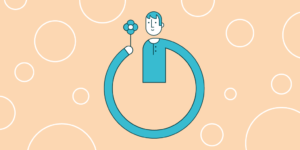 Lastly, self-help is like a gold mine for people with eating disorders. There are many different self-help resources available, including books, articles, websites, and support groups. Some of the most effective and easy tips to follow are:
Lastly, self-help is like a gold mine for people with eating disorders. There are many different self-help resources available, including books, articles, websites, and support groups. Some of the most effective and easy tips to follow are:
- Start by accepting that you have an eating disorder and that you need help. This is a very important first step.
- Educate yourself about eating disorders and learn as much as you can about your disorder. Knowledge is power!
- Find a support group or online community of people who understand what you’re going through. It can be very helpful to connect with others who are going through similar experiences.
- Maintain a food journal. In this, you can track your food intake, feelings, and behaviors. This can help you to identify patterns and triggers.
- Make sure to eat regular meals and snacks and avoid skipping meals. Skipping meals will only make your symptoms worse.
- Avoid dieting and instead focus on eating a balanced, nutritious diet.
- Exercise regularly, but make sure not to overdo it.
- Find alternative outlets. When you’re feeling the urge to engage in disordered eating behaviors, find something else to do instead. Go for a walk, read a book, call a friend, or write in your journal.
Orthorexia nervosa is a serious and potentially dangerous eating disorder that should not be taken lightly.
Conclusion
We can now conclude that orthorexia nervosa is a relatively new diagnosis, and there is still much to be learned about the disorder. However, we do know that it can be dangerous and even fatal if not treated properly. If you think that you may be suffering from orthorexia, it is important to seek professional help as soon as possible. This disorder can quickly become extremely dangerous and even life-threatening. It is crucial to stay alert for the signs and symptoms of orthorexia and to get help as soon as possible if you or someone you know is displaying them.
If you or someone you know is looking for psychological help, Therapy Mantra is here for you. We are the leading providers of online therapy and counseling. Our team of highly trained and experienced therapists can provide assistance at the most affordable rates. We also have a team of nutritionists providing nutritional counseling to manage food-related problems. Contact us today to learn more about our services. You may also visit our website to book an online therapy session or download our free Android or iOS app for more information.


